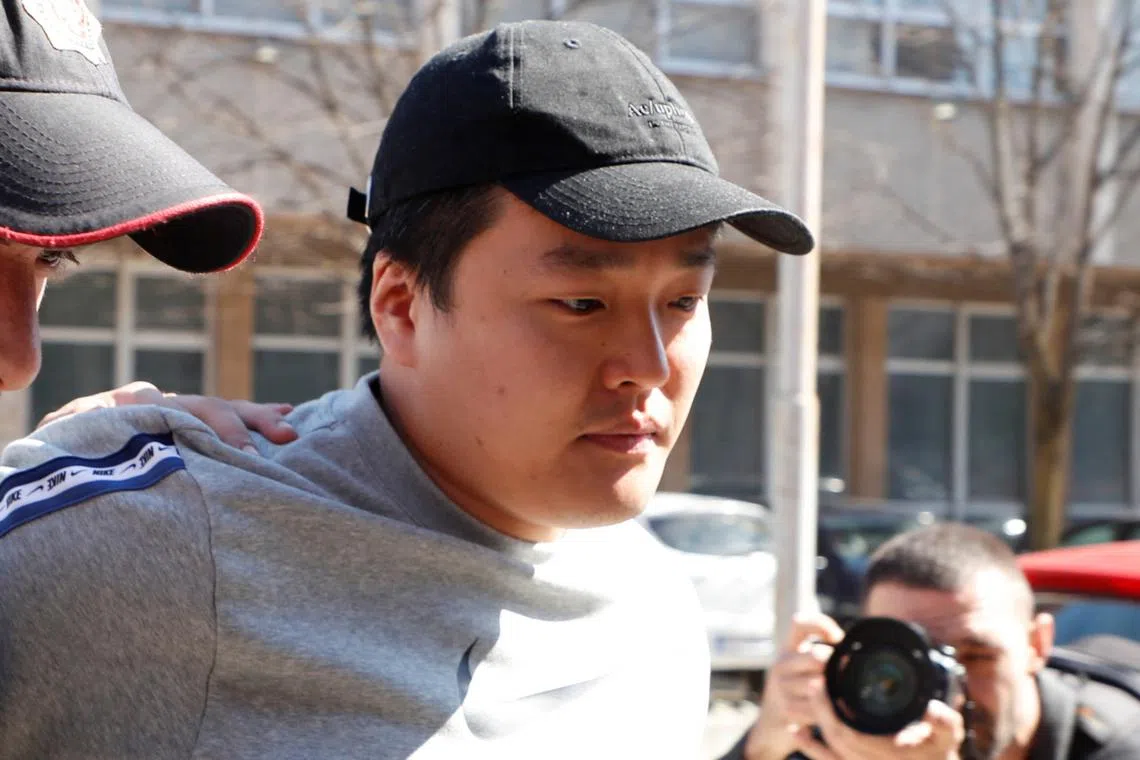Do Kwon: A crypto fugitive’s very public life while on the run
Sign up now: Get ST's newsletters delivered to your inbox

Do Kwon being taken to court in Podgorica, Montenegro, on March 24, 2023, after he was arrested while trying to board a flight to Dubai on Saturday.
PHOTO: REUTERS
SAN FRANCISCO – Not long after the South Korean government issued a warrant for his arrest, Do Kwon, a cryptocurrency entrepreneur who became a fugitive, joined a live stream with two popular crypto podcasters.
They had arranged for Kwon to speak alongside Martin Shkreli, a former pharmaceutical executive who was sentenced to seven years in prison for fraud.
“Hey, Do,” Shkreli said on the stream last November. “I just wanted to let you know that jail’s not that bad. It’s not the worst thing ever.”
Kwon smiled and nodded. “Good to know,” he said.
On Thursday, Kwon, 31, was arrested in Podgorica, the capital of Montenegro,
The arrest was the culmination of a remarkable tale of international intrigue and crypto industry chutzpah. Kwon became a target of criminal investigators in at least three countries after two cryptocurrencies issued by his company, Terraform Labs, collapsed virtually overnight.
The crash set off a market meltdown that tanked the prices of popular digital coins such as Bitcoin and Ether and sent the crypto industry into crisis. In just a few days, Kwon went from industry luminary to industry villain. Some investors in his virtual currencies lost their life savings.
After his business collapsed, Kwon travelled around Europe and Asia, from Singapore to Serbia to Montenegro, while insisting on Twitter that he was not “‘on the run’ or anything similar”.
Even as the global authorities sought his arrest, Kwon gave interviews to reporters and podcasters and tried to revive his crypto business with a new digital coin. In a brief call with The New York Times early in March, Kwon said he had not “declined requests” to share his location with the authorities.
“They obviously know where I am,” he said.
His arrest is now poised to set up a battle over his extradition. On Thursday, federal prosecutors in the Southern District of New York charged Kwon with eight counts of fraud. The authorities in his native South Korea have also accused him of financial crimes.
South Korea plans to “proceed with the extradition process in accordance with the law and international agreements”, the country’s Ministry of Justice said in a statement on Friday.
A year ago, Kwon was one of the richest and most powerful figures in the crypto industry. After graduating from Stanford University with a degree in computer science, he started Terraform Labs, which issued two closely linked digital currencies: TerraUSD, a stablecoin with a price of US$1, and Luna, a more traditional cryptocurrency with a fluctuating value.
TerraUSD was designed to maintain its US$1 value through financial engineering that connected it with Luna. The coins became wildly popular, and the value of all the Luna in circulation climbed to US$40 billion (S$53.3 billion) as the crypto market boomed in 2021 and early 2022.
Kwon cultivated a brash persona on Twitter, dismissing critics with tweets such as “I don’t debate the poor”.
His passionate followers called themselves “Lunatics”. One of his prominent venture capital backers, Mr Mike Novogratz, even had a Luna-themed tattoo of a wolf howling at the moon.
Then Kwon’s business crashed. Last May, the price of Luna dropped precipitously, bringing TerraUSD down with it. The implosion erased tens of billions of dollars in value and caused a domino effect that led to the collapse of major crypto companies, including FTX,
Soon, Kwon was the target of criminal investigations. Last September, South Korean prosecutors charged him and five others with violating the country’s financial laws. Interpol, the international police organisation, issued a “red notice” demanding his arrest.
According to the Interpol office in Seoul, Kwon arrived in Singapore last April before leaving for the UAE last September, the month that South Korea issued the arrest warrant for him. Investigators believed the trip to the UAE was a stop on the way to Serbia, where Kwon went into hiding with Terraform’s former chief financial officer Han Chang-joon.
Kwon arrived in Montenegro about 10 days ago, said the country’s Prime Minister Dritan Abazovic. On Thursday, Kwon went to the airport with Han. They presented passports from Costa Rica, which immigration checks revealed were forgeries.
The Montenegrin police arrested the pair at 9am local time (4pm Singapore time) and notified the Interpol bureau in Seoul, asking for confirmation that they had correctly identified them, according to the statement by South Korea’s Justice Ministry. A fingerprint match confirmed their identities.
The next step in the case is likely to involve extradition, a complex legal process that can sometimes take months to unfold. Mr Nick Biase, a spokesman for the US attorney’s office for the Southern District of New York, said prosecutors in the United States were seeking Kwon’s extradition. The South Korean government said on Friday it was also planning to have Kwon extradited.
“We will see what is the first request, and after that we are ready to make the extradition to the country which is looking for him,” Mr Abazovic said in an interview.
Whatever Kwon’s ultimate fate, the news of his arrest was greeted with celebrations in the crypto community, where he has become a deeply unpopular figure since the collapse of Luna and TerraUSD.
“I’ve been waiting for this moment for a long time,” tweeted one account that has tried to mobilise victims of the Luna crash. NYTIMES


